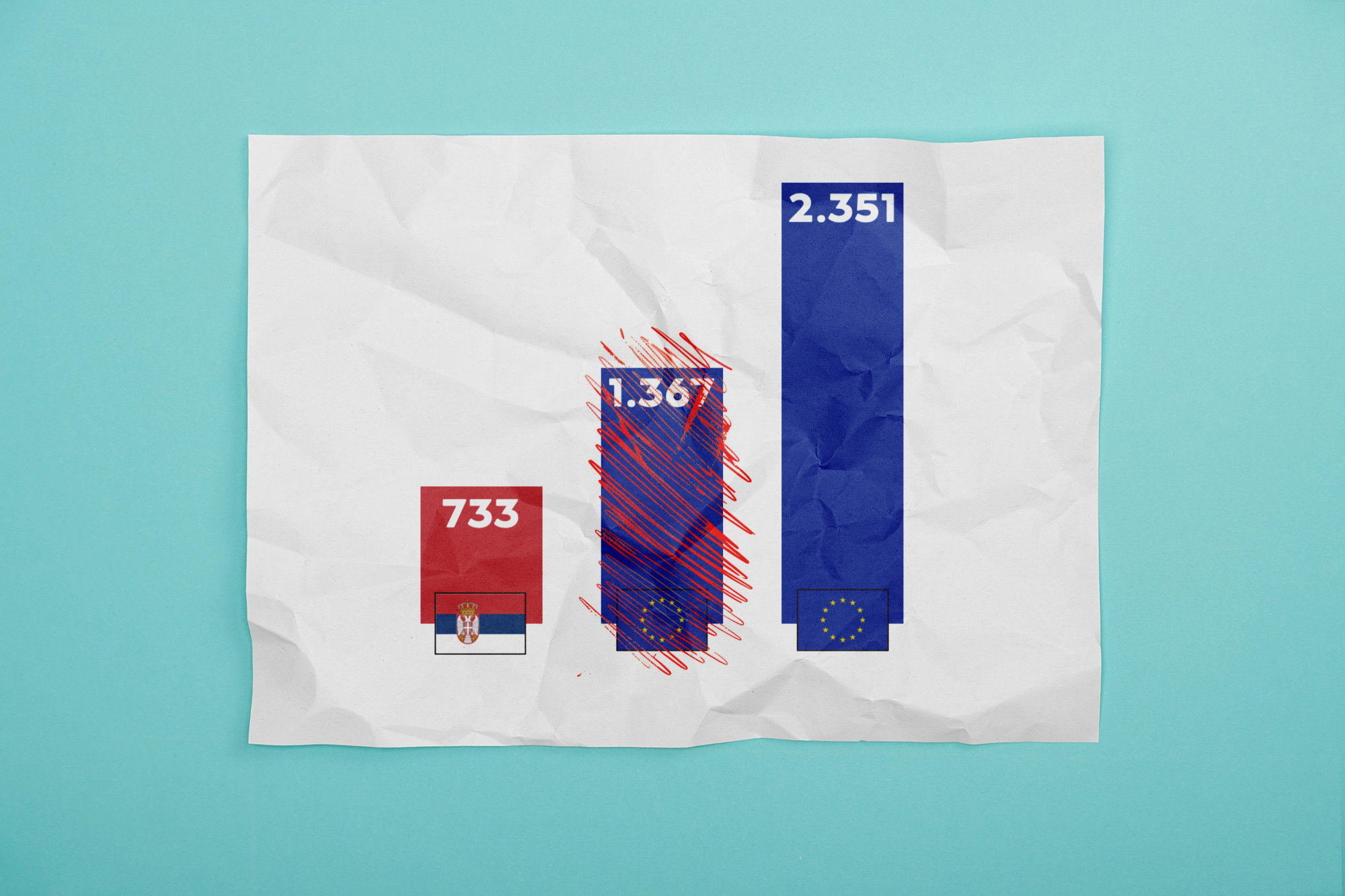Original article (in Serbian) was published on 17/9/2024; Authors: Stefan Janjić and Jelena Jovović
It started like this: a journalist from “Danas” made a mistake when calculating the average salary in the European Union, using incorrect data from Eurostat. It continued like this: the flawed calculation ended up not only on other web portals but was also utilized in analyses by “Radar”, “Euronews Serbia”, “Tabloid”, and even a Dutch web portal dedicated to agriculture. It ended like this: using incorrect data, the “Institute for Policy and Economy of Southeast Europe” created its analysis, which included the absurd projection that the average Serbian salary would catch up to the European one in 16 to 17 years. A whole range of media euphorically shared the results of this analysis.
How Did “Danas” Get the Incorrect Data?
In an article published on August 21, “Danas” systematically compared prices in Serbia and the European Union. At the very end, the average salaries in Serbia and the EU were also compared. The author decided (and this is very important for the further course of the story) to compare the years 2020 and 2023 based on Eurostat data. In 2020, the author states, the average net salary in Serbia was 510 euros, while in the EU it was 1,140 euros, and in 2023, it was 733 euros in Serbia and 1,367 euros in Europe.
Since the reported amounts of average net EU salaries seemed unrealistically low to us, we tried to determine how “Danas” got those figures. We realized that the journalist could only reach the averages of 1,140 (for 2020) and 1,367 (for 2023) if he selected the wrong category on Eurostat, choosing the first indicator from the dropdown menu — “Single person without children earning 50% of the average earning” — instead of the indicator “Single person without children earning 100% of the average earning”.
As a result of this mistake, the average EU salary was presented as much lower than it actually is. It was 1,992 euros in 2020 and 2,351 euros in 2023.
We wrote to the journalist on September 12, and he admitted that he made a mistake by choosing the wrong category. He entered the corrected, accurate amounts. You can view the original version of the text here and the corrected version here.
However, by the time the error was detected, it had appeared in a large number of domestic media outlets with various editorial policies. In addition to those that directly shared the text, there were others that, based on identical incorrect data, created their analyses and projections without referencing “Danas”.
Which Media Outlets Reported the Incorrect Claims?
The text (or its agency version) was initially reported by 021, N1, Radio sto plus, Ekapija and Luftika, as well as by a web portal specializing in economics — Nova Ekonomija. Identical incorrect data regarding the average net EU salary was used in new articles by Euronews Srbija and Tabloid, and it was also found in an article by the weekly “Radar”. Additionally, it was used by a Dutch website dedicated to agriculture in a text concerning the Serbian economy. The incorrect data was also reported by Biznis.rs and the Mond web portal focused on the European Union and Euro-integration, “EUpravo zato”.
What Did the Analysis of the Institute for Policy and Economy of Southeast Europe Show?
The “Institute for Policy and Economy of Southeast Europe” (IPESE) gave new momentum to the spread of the incorrect data with its analysis titled “Serbia at the Top of Europe in GDP Growth: How Construction Became the Key Factor?”, published on September 8. Although IPESE cites Eurostat rather than “Danas”, it repeats the identical mistake and compares the same years as the journalist from “Danas”.
What is IPESE?
According to the website of the Institute for Policy and Economy of Southeast Europe, it is an “independent research and action center dedicated to promoting regional stability and prosperity through cooperation, research, and education”. Based on the data from the Business Registers Agency, IPESE was registered in November 2022, and its founder is Zoran Korac. In an interview with the Montenegrin “Vijesti”, Korac stated that he promised to help Vucic when he realized “his definite commitment to moving towards the Western world”, but he also mentioned that some “private matters” distanced him from the Serbian president and that he has no influence over him.
And not only that: IPESE, starting from the incorrect data about the average net salary in the EU, makes a calculation that “proves” that, at this rate, the average Serbian net salary will catch up with the European one “in 16-17 years, which just a decade ago seemed like an impossible mission”.
A new wave of disinformation begins: the conclusions of the IPESE analysis are optimistically reported by Radio-televizija Vojvodine, Politika, Telegraf, Russia Today (in Serbian), BIZinfo, Alo, Kurir, Dnevnik.
We asked the Institute to explain how they got the figure of 1,367 euros for the average EU net salary in 2023, but they did not respond to our inquiry.
What Does the Real Data Show?
If the average Serbian net salary in 2023 was 733 euros, that would mean its value was not 53.6% of the European one—as IPESE claims—but rather 31.2%, given that the average European net salary was 2,351 euros.
As a result, the Institute’s triumphant projection of reaching the European average by 2040 also falls apart.
Note: By the time this article was published on the SeeCheck website, Mondo’s portal “EUpravo zato” had corrected the false statements in accordance with professional standards.



